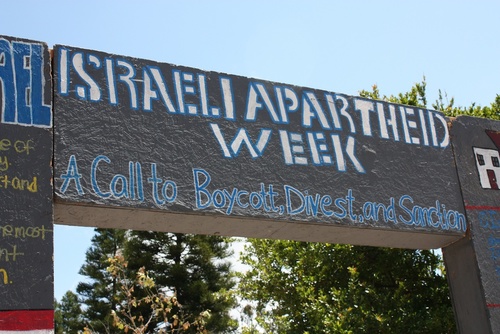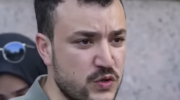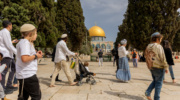If meaningful reform is to take root in American colleges, it must begin with a renewed commitment from the media.
By Rachel O’Donoghue, Honest Reporting
The horrors of October 7 unleashed a wave of antisemitism that, for many of us, was sadly unsurprising. We’ve seen this before.
In May 2021, when Hamas launched an 11-day war against Israel with a relentless barrage of missiles, anti-Jewish hatred quickly resurfaced. Critics seized on the conflict to vilify Israel, questioning its right to self-defense. “Why should Israel defend itself?” they screamed. The disparity in military capabilities was their rallying cry — as though Israel should willingly allow its citizens to become sitting ducks simply because defending them would result in an uneven death toll.
Their warped rationale reframed Israel’s very act of survival as aggression. To them, the lower number of Israeli casualties wasn’t a sign of successful protection but evidence of a moral failing.
The first wave of college campus protests — ostensibly in support of the Palestinians — came just days after October 7. Even as the bodies of massacre victims were still being recovered and identified, and while it remained unclear who had been killed or abducted into Gaza, American students were already gathering on campus lawns, chanting slogans like “Free, free Palestine,” “Palestine is here and proud,” and the infamous “From the river to the sea.”
The anti-Israel campus protests quickly mutated in the days and weeks following October 7. What began as rallies led by familiar groups like Students for Justice in Palestine and the ironically named Jewish Voice for Peace soon swelled into broader support from the general student population.
This escalation was enabled by the alarming inaction of college faculty and leadership, who stood by as student mobs commandeered campus quads to set up so-called “Zionist-free” zones. These makeshift encampments, they proclaimed, would remain until university administrations caved to their nebulous demands for “divestment” from companies with tenuous, if any, connections to Israel.
Yet, these student protests and the horrifying displays of antisemitism they showcased brought into sharp focus a long-festering issue that HonestReporting and others have been warning about for years: the pervasive antisemitism on college campuses.
For years, Israel’s efforts to defend itself from terrorists seeking its annihilation have been seized upon by college activists, eager to use them as a pretext for antisemitism.
During the 2006 Lebanon war, U.S. college campuses saw a surge in antisemitic incidents. A 2005 briefing by the U.S. Commission on Civil Rights had already sounded the alarm on how criticism of Israel frequently crossed the line into blatant antisemitism. The usual suspects were named: Columbia University, the University of California at Irvine, UC Berkeley, Northwestern, and others. The scenes that unfolded on these campuses mirrored the abhorrent incidents we’ve witnessed in the past year: Holocaust memorials built by students were desecrated, swastikas were carved into tables meant for Holocaust memorial candles, and antisemitic speakers appeared on campus podiums to address crowds of impressionable 18-year-olds, pushing hateful rhetoric like the “Jewish Cracker theory” and warning them to be wary of “arrogant” Jews.
There was the brick thrown through the Hillel building’s windows during Passover, visibly Orthodox Jewish students attacked, and Jewish students reciting the Kaddish at a Holocaust memorial drowned out by their peers praising Palestinian suicide bombers. In yet another vile incident, a three-foot swastika was scrawled alongside the phrase “Die Jews” on a campus wall.
How The Media Became Campus Co-Conspirators
A report released this month by the ADL lays bare the troubling state of American campuses over the past year, documenting a 477% increase in anti-Israel incidents. These incidents have included the promotion of classic antisemitic tropes, such as references to Jewish wealth and control, as well as open expressions of support for terrorist organizations like Hamas and Hezbollah.
Jewish student centers like Hillel and Chabad were frequently targeted, with at least 73 incidents directly impacting these organizations, including calls for universities to sever ties with them. Protests outside their buildings and events disrupted Jewish life across numerous campuses.
When college administrators finally took action after months of disruptions—spurred by both their disastrous Congressional testimonies and threats from high-profile donors to pull hefty endowments—university presidents began to fall on their swords and resign. Among those who stepped down were Penn’s Liz Magill and Harvard’s Claudine Gay. Some felt a flicker of hope, believing this might signal a broader recognition of the problem—that institutions were finally waking up to what Jewish students have been voicing for years.
But that hope is misplaced. In truth, college campuses are just a microcosm of a wider problem, where antisemitism is widespread and Israel is uniquely vilified. This issue isn’t confined to academia—it often begins with the journalists covering these conflicts, shaping the public narrative.
The irony is that the media’s coverage of the student protests perfectly demonstrated their own anti-Israel bias. As videos flooded online—showing Jewish students being harassed and pro-terror chants echoing across the manicured lawns of America’s elite institutions—the evidence was clear for millions to see. Yet much of the international media downplayed or excused the protests, reinforcing the very problem they were supposed to report on. Even when they acknowledged the incidents, the coverage was often dismissive, minimizing the severity of the antisemitism on display.
Amid its generally supportive coverage of the student protests, The New York Times sent a journalist to file a “dispatch from inside Columbia’s student-led protest”—the same college that later fired faculty over antisemitic posts. It was striking that while the reporter could freely enter the protest and write about it, any so-called “Zionist” student attempting the same would have faced immediate hostility and exclusion.
In the first paragraph of the article, the journalist conveniently witnesses a moment that supposedly proves the Columbia campus demonstrations weren’t on the whole antisemitic. Across the street from the university, a man—clearly not a student—with a large gold cross around his neck, is waving a bloodied Israeli flag and shouting, “The Jews control the world! Jews are murderers!” As if on cue, a “pro-Palestinian” student calmly walks over and tells him, “That is horribly antisemitic. You are hurting the movement, and you are not a part of us. Go away.” The man obliges and leaves.
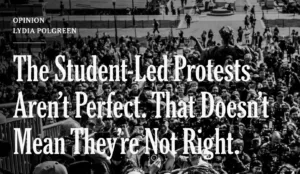
The Guardian ran a “video guide to the protest movement,” complete with maps and infographics, informing readers that the “war in Gaza [had] unleashed the biggest outpouring of U.S. student activism since the anti-racism protests of 2020.” There it was, in the first sentence—The Guardian’s view was unmistakable: the anti-Israel protests were morally equivalent to anti-racism demonstrations. Students shouting that “Zionist pigs don’t deserve to live” were, in the eyes of the outlet, imbued with a sense of righteousness. The paper’s seal of approval, complete with a guide for others to join in, effectively encouraged more students to intimidate their Jewish peers.
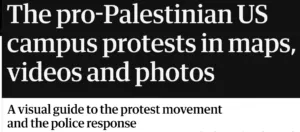
Meanwhile, a glowing feature in The New Yorker hailed the protests as a “national uprising of students to end the war in Gaza and, for some, to end their institution’s financial ties to Israel.” But that was hardly the full extent of their demands. Some college protestors went even further than the official BDS movement, calling for individual Zionists and Israelis to be banned from campuses—a stance that, according to the ADL, breaks with USACBI guidelines, which specifically advocate for “the boycott of Israeli institutions, not individuals” and “[reject] on principle boycotts of individuals based on their identity or opinion.”
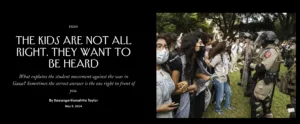
For months, the media narrative was unwavering: the students, guided by their unimpeachable moral compasses, were on the side of righteousness. Even when protests veered unmistakably into antisemitism, we were reassured that these were merely isolated incidents—just a few “bad apples.”
The prevailing wisdom, as The New Yorker so confidently asserted, was that the kids were not all right—but only because they weren’t being heard. Even as universities, after much delay, were finally forced to act—dismantling encampments, suspending students, and issuing long-overdue disciplinary actions—the media somehow continued to rally behind a cause that had rapidly devolved into the indefensible.
And now, here we are, with a new academic year just beginning.
Repercussions and Lessons Learned?
Yet, despite the break in protests and leadership resignations, the reality is that we’re likely to see a repeat of last year’s scenes—if not over the current war against Hamas, then certainly the next time Israel makes headlines.
Why? The inadequate and delayed responses from universities only served to embolden the protesters. It’s this hesitancy, coupled with words of approval from university leadership in the early stages, which allowed the demonstrations to persist for as long as they did. In fact, some of the key figures behind the protests have even been rewarded by their institutions.
For example, the Columbia University student who famously demanded “humanitarian aid” and “a glass of water” for protesters—claiming they’d “die of dehydration and starvation” without support from the administration—now teaches a required undergraduate class. At the same institution, Professor Joseph Massad, who openly praised Hamas, still holds his position teaching Middle East studies, facing no consequences. Likewise, at Cornell, the professor who described the October 7 Hamas attacks as “exhilarating” remains unpunished and continues teaching.
Second, and perhaps more troubling, is the fact that many in positions of authority at these academic institutions see no need for punishment—largely because they align with the broader sentiments expressed. The normalization of anti-Israel rhetoric has reached a point where even calls for the deaths of “Zionists” are shrugged off as poor word choice or an excess of passion, while the underlying ideology is tacitly accepted.
It’s difficult to imagine such grotesque views being directed toward the citizens of any other nation, let alone met with the same indifference or rationalization.
At the core of this issue lies the media. In Europe, the press has traditionally been regarded as the “fourth estate”—distinct from the clergy, nobility, and commoners—acknowledging its powerful role in holding other estates accountable and shaping public understanding. However, when it comes to the Israel-Palestinian conflict and the surge of antisemitism, the media has abdicated this crucial role. Where it once sought to expose, scrutinize, and challenge, it now falters. Increasingly, journalists position themselves not as impartial purveyors of truth, but as activists, emboldened by employers that sanction such partisanship.
If meaningful reform is to take root in American colleges, it must begin with a renewed commitment from the media. Journalists must reclaim their role as objective arbiters, subjecting issues to rigorous scrutiny rather than ideological alignment. The path forward requires a return to the fundamental duty of their profession: to illuminate the truth, without fear or favor.
Do You Love Israel? Make a Donation - Show Your Support!
Donate to vital charities that help protect Israeli citizens and inspire millions around the world to support Israel too!
Now more than ever, Israel needs your help to fight and win the war -- including on the battlefield of public opinion.
Antisemitism, anti-Israel bias and boycotts are out of control. Israel's enemies are inciting terror and violence against innocent Israelis and Jews around the world. Help us fight back!
